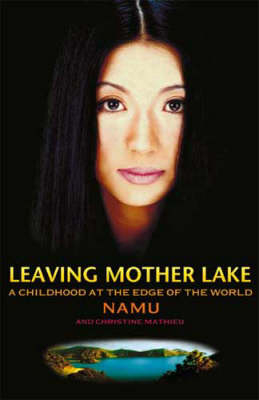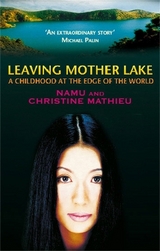
Leaving Mother Lake
A Girlhood at the Edge of the World
Seiten
2003
Abacus (Verlag)
978-0-349-11582-5 (ISBN)
Abacus (Verlag)
978-0-349-11582-5 (ISBN)
- Titel erscheint in neuer Auflage
- Artikel merken
Zu diesem Artikel existiert eine Nachauflage
The Tibetans refer to Moso country as "The Country of Daughters" because of their unique matrilineal society, where daughters are the favoured children and there is no word for father. This memoir reveals the life of Namu who left to join a music conservatory and became "the Tibetan Madonna".
The Tibetans refer to Moso country as "The Country of Daughters" because of their unique matrilineal society. In Moso culture, daughters are favoured children. There is no word for father, marriage is considered a backward practice and property is passed on from mother to daughter. This book is the haunting memoir of a girl growing up in a remarkable place. In her village, Namu was known as the girl whose mother tried to give her away three times because she would not stop crying. The strong-willed Namu clashed with her equally fierce mother, becoming alienated from village life. When Chinese officials came looking for talented singers, she seized her chance and broke the taboo that holds Moso culture together - she left her mother's house. Winning a place at the Shanghai Conservatory of Music as a special minority student, Namu became "the Madonna of Tibet", singing on the soundtrack of "The Joy Luck Club". A lyrical combination of anthropology and memoir, this is a story full of surprise, drama and beauty. It is a universal tale of mothers and daughters - the battles that drive them apart and the love that brings them back together.
The Tibetans refer to Moso country as "The Country of Daughters" because of their unique matrilineal society. In Moso culture, daughters are favoured children. There is no word for father, marriage is considered a backward practice and property is passed on from mother to daughter. This book is the haunting memoir of a girl growing up in a remarkable place. In her village, Namu was known as the girl whose mother tried to give her away three times because she would not stop crying. The strong-willed Namu clashed with her equally fierce mother, becoming alienated from village life. When Chinese officials came looking for talented singers, she seized her chance and broke the taboo that holds Moso culture together - she left her mother's house. Winning a place at the Shanghai Conservatory of Music as a special minority student, Namu became "the Madonna of Tibet", singing on the soundtrack of "The Joy Luck Club". A lyrical combination of anthropology and memoir, this is a story full of surprise, drama and beauty. It is a universal tale of mothers and daughters - the battles that drive them apart and the love that brings them back together.
Namu divides her time between Beijing, Geneva, and San Francisco. Chrisitne Mathieu is an anthropologist and short story writer.
| Erscheint lt. Verlag | 20.3.2009 |
|---|---|
| Zusatzinfo | Integrated: 1, b/w |
| Verlagsort | London |
| Sprache | englisch |
| Maße | 153 x 234 mm |
| Gewicht | 410 g |
| Themenwelt | Literatur ► Biografien / Erfahrungsberichte |
| ISBN-10 | 0-349-11582-6 / 0349115826 |
| ISBN-13 | 978-0-349-11582-5 / 9780349115825 |
| Zustand | Neuware |
| Haben Sie eine Frage zum Produkt? |
Mehr entdecken
aus dem Bereich
aus dem Bereich
Caspar David Friedrichs Reise durch die Zeiten
Buch | Hardcover (2023)
S. Fischer (Verlag)
25,00 €
Geschichte, Positionen, Perspektiven
Buch | Softcover (2024)
C.H.Beck (Verlag)
12,00 €



